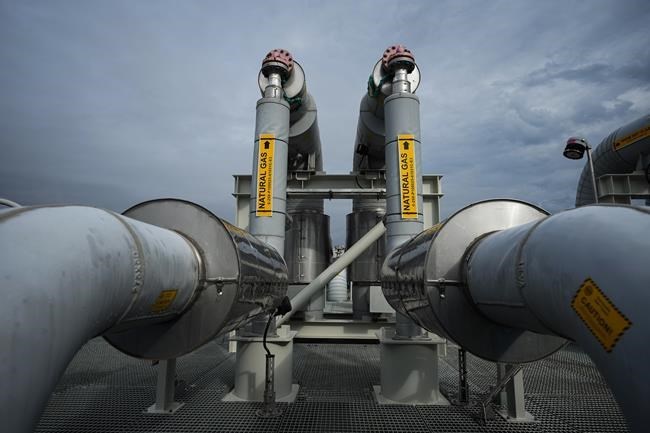TORONTO — First Nations are set to increasingly become equity partners in major projects, a shift that could lead to self-sustaining financial independence, said the chair of the First Nations Major Projects Coalition.
Speaking at the coalition's annual conference Monday, chair Sharleen Gale, chief of the Fort Nelson First Nation, said it's all part of a move toward consent and community involvement being at the forefront of project development.
"There's a new way of doing business within our traditional territories," said Gale. “We know our worth, and we know how important it is for us to be a part of our economies meaningfully.”
Industries need to understand that consent and benefit agreements are no longer enough, she said.Â
"That's a new standard that industry really needs to understand, that equity is important.”
To make the leap to equity owners will take money, and with interest rates running high, Gale said competitively priced capital is crucial.Â
She said the coalition came together close to a decade ago in part because First Nations were being offered credit card-level interest rates for project financing, making it difficult to get anything off the ground.
The $5-billion Indigenous loan guarantee announced last week in the federal budget is an exciting step to making capital cheaper, she said — the profits of which could be used to fund even more projects.
“As we lift more Indigenous nations off the ground with the Indigenous guarantee program, you will see that eventually we may not even need it, because we'll be creating our own source of revenue."
RBC chief executive Dave McKay, in conversation with Gale at the conference, said the country is in the early days of building that self-sustaining cycle.
"To start is hard ... this is the hardest part of it, but then you're going to get a flywheel effect where you're going to reinvest from one project into the next.”
He said the $5-billion federal commitment is a good start, though not nearly enough. He said there are so many projects getting underway, especially related to the energy transition, that will create so many opportunities and funding needs.
Help with financing will also be important in securing proper Indigenous consent, said McKay.
"It's so important that we do this the right way right from the start, and we don't fall into the traps we have in the past.”
Securing proper consent is not easy.Â
RBC has faced criticism for its funding of both the Trans Mountain and Coastal GasLink pipelines, projects that have seen both support and stiff opposition among First Nations.
Both projects have now finished construction and are therefore significantly derisked, helping lower the cost of capital for First Nations to buy in.Â
McKay said it's just a matter of time before there are equity deals announced on pipelines, along with success stories to come from better co-operation. Â
“We've limited ourselves as a country because we haven't worked together, and now that we work together, we should take on bigger and bolder ideas.”
The shift in relationships is coming in part because of Canada's acceptance of the UN Declaration on the Rights of Indigenous Peoples, said Perry Bellegarde, former national chief of the Assembly of First Nations.
“We use that free, prior and informed consent clause as a way, and as a tool, to bring governments and industry to our tables," he said at the conference.
Along with codifying into law the high standard of consent, Bellegarde said it was also important that Canada has rejected the doctrine of discovery, which said any land not yet occupied by Christians was deemed vacant, and so could be claimed by colonizers.
The recognition of the right to self-determination, the right to their own lands, their own laws, is crucial in navigating between growth and sustainability, he said.Â
"That right is so important when it comes to looking at the balance between the environment and the economy, seeking to always balance, to find that sweet spot.”
He said it's a good message on Earth Day, to remember that by securing rights, Indigenous people are also seeking to uphold responsibilities, to the generations ahead and to the natural world.Â
"Us as two-legged have great responsibility to fit into that global family if you will, so that we can have a hope for the future, our children and grandchildren can have a hope for the future."
This report by The Canadian Press was first published April 22, 2024.
Companies in this story: (TSX:RY)
Ian Bickis, The Canadian Press



